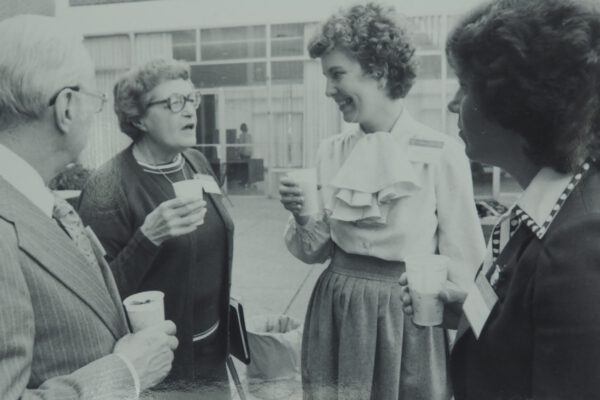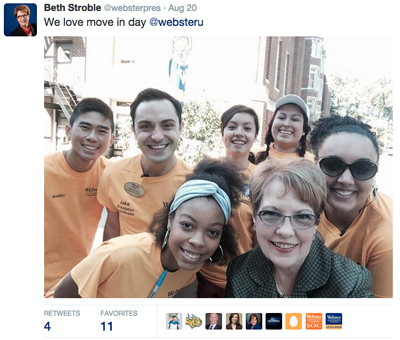Although women higher education leaders continue to be underrepresented at institutions across the country, many women have established rewarding and successful careers in the field—thanks in part to having had role models and mentors whose paths they could follow. Below, Ann Marie Klotz and Teri Bump, Kara Gravley-Stack, and Thomas L. Keon discuss the vital importance of mentors in advancing through the ranks.
The Difference a Sponsor Can Make
By Ann Marie Klotz and Teri Bump
When someone looks back on a successful career, they often reminisce about the mentors who supported them on their journey. They think of those moments when they were at a fork in the road, and a wise sage imparted advice that helped them make important decisions that impacted their career trajectory. But while mentors are important and cherished figures in our professional life, it is the direct influence of sponsors that is the most critical. What separates a mentor from a sponsor is, quite simply, power.
In her book Forget a Mentor, Find a Sponsor: The New Way to Fast Track your Career, Sylvia Ann Hewlett writes that if you are interested in fast-tracking your career, you need a senior-level champion who believes in your potential and is willing to advocate for you. A mentor can help you weigh the pro and cons of whether you should open a certain door. A sponsor throws the door open for you. They are putting their name on you, endorsing you, and actively removing obstacles from your path.
For women and people of color, sponsorship is even more critical. Because underrepresented groups often get little to no feedback at work, they are often in need of sponsors who see their greatness and deliver the kind of advice and insight they will not receive from their boss or peers. Sponsors are invested in your success and as such will tell you what no one else will. This allows the person to course-correct, calibrate their actions, and improve.
A sponsor is tremendously important for senior-level administrators. While deans, vice presidents, and presidents have achieved a great deal of career success, a powerful sponsor can help you to gain entrance into spaces that you never knew existed and would never be invited to. This is helpful when looking to build your professional network, be considered for an award or academic publication, or serve on an important committee or board.
There are many challenges in the higher education sphere, including understanding the unwritten rules of behavior, figuring out the professional work culture, and navigating the political landscape, which can take a while to learn based on the culture of your college or university. In the event of a professional misstep that could prevent you from achieving a specific goal, one word from a sponsor can remove that barrier.
So how does one find a sponsor? These relationships often take a while to develop because the sponsor has to be willing to put their name on you. Typically, a relationship will naturally develop and the onus is on the person seeking to be sponsored to follow up with the potential sponsor and repeatedly demonstrate their value and potential. A sponsor may test you to see if they should continue their sponsorship—for example, getting you entrance into a dinner party with powerful people and seeing how you interact with the group.
It is also important to diversify your sponsorship. Seek sponsors who look and think differently than you. Not all sponsorship relationships have to be long term—some can be for a specified event or opportunity—but all are valuable. And it is essential to continue the chain of sponsorship as you advance in your career. Seek out high-potential talent in your entry and mid-level staff and open doors for them whenever possible.
In any career, it does indeed take a village, and your village should include influential sponsors who know your professional ambitions and dreams and can help make them a reality.

North Dakota WHEN Launches Next Step Mentorship Program
By Kara Gravley-Stack
“I think mentors are important and I don’t think anybody makes it in the world without some form of mentorship.” — Oprah Winfrey
As state coordinator for the North Dakota Women in Higher Education Network (NDWHEN), I have had the privilege to work with a dedicated board comprised of women leaders in higher education throughout our state. We have hosted a successful annual fall conference for several years that draws women working in student and academic affairs across the region. Consistent feedback from these attendees, as well as our own professional experiences, has pointed to a need for structured mentoring opportunities for women in various stages of their higher education careers.
With that need in mind, NDWHEN hosted our most recent conference in November with the theme “Courage – Compassion – Connection.” As an important extension of that conference theme, we announced the launch of a new initiative, the Next Step Mentorship Program. Next Step seeks to pair aspiring leaders with mentors who currently hold, or have held, the types of leadership positions that will be the next step in career advancement for our aspiring leaders.
The idea is to facilitate aspiring leaders having direct access to someone who has “been there, done that” in their specific career path and at a different institution within the state. Ultimately, our goal is to move the needle by increasing the representation of women at the highest levels in North Dakota’s colleges and universities, throughout student affairs, academic affairs, and in all other branches of educational leadership.
To facilitate the most appropriate matches of aspiring leaders to mentors, participants completed a brief survey of their past professional experience, future career goals, areas of specialty, and anticipated outcomes from their participation in this program. NDWHEN board members reviewed the materials and made the most appropriate matches, ensuring that the aspiring leaders were matched with mentors who work at a different college or university in the region.
A few expectations were set out for both the aspiring leaders and the mentors. Aspiring leaders must currently work in higher education, make the initial contacts with their assigned mentors once the matches have been made, and come to their meetings prepared with questions or topics to discuss. Similarly, mentors must be (or have been) in leadership roles in higher education and must be willing to commit time and energy to be responsive to their aspiring leaders during their meetings. Both parties agreed that they would connect—either in person or through technology—at least three times during their one-year participation in the program.
Since the Next Step Mentorship Program is new, we look forward to feedback from all participants, both at the mid-point and at the end of the year-long commitment.
Additional information for NDWHEN and the Next Step Mentorship Program can be found on our website.

Moving the Needle: Lifting As We Climb Through Strategic Alliances
By Thomas L. Keon
Seasoned leaders are responsible for a myriad of institutional directives, including strategic planning, balanced budgets, monitoring market trends, progress reporting—the list keeps growing in complexity and breadth. As the demands on effective leaders continue to swell, a key requirement that deserves full attention is each leader’s role as cultivators of new leaders.
It is essential that we all mentor and develop individuals who show potential within the universities we serve. Mentoring allows for the development of others and, if orchestrated properly, the experience also allows for self-reflection and self-development. Mentors must leave themselves open to input while guiding those who are learning. After all when we teach, it also requires us to live what we know, right? This interplay allows the mentee the ability to better understand operational outcomes, and it brings home the understanding of the intellectual process one must consider when making important and key decisions. The greatest opportunities to examine the critical nature of this relationship are most obvious during periods of stress.
Change seems to be one of the greatest stressors for leaders. And, going forward in higher education, change is inevitable. Thus, we must all learn to understand change and learn to deal with the stressors associated with change. A key point for leaders facing change is an ability to listen. The listening skill deserves extra emphasis. Sometimes the urgency to act and the requirement to simultaneously exercise caution can be fertile ground for a leadership misstep. Often this means the listening skill needs to be in high gear to accomplish the best possible outcome.
Self-mentoring is important to all when considering developing yourself for leadership roles. When considering strategic alliances, one should take stock of personal strengths and weaknesses and use alliances strategically to reinforce strengths and to make up for deficits. For example, one might actively request to serve on a search committee in an area of the university where one has had little or no significant experience. Recently, one of my mentees asked to serve on the university athletics committee to gain some experience and information on athletics.
Alternatively, developing relationships with a variety of university partners can further one’s strengths and provides outreach opportunities. Anyone moving up through the ranks can gain great insights when they become involved with affiliates of the university. Our dean of the College of Humanities, Education, and Social Sciences is quite involved with the arts in our geographic area and has used those relationships to work even more closely with our host city to enhance downtown efforts to expand options to local residents in the arts.
For all of us in leadership roles, we must provide guidance and mentoring through our own actions. We should be building diverse teams and constantly monitoring individuals who can become future members of the leadership team. The action of reaching out to identify and then let individuals know you have interest in them is vital because it encourages them to consider activities that will lead to future leadership. This is overwhelmingly important to the mentee. So as leaders, we must constantly monitor and mentor with an eye toward diversity to strengthen the decision-making and evidence of abilities for future decisions and options.
Finally, it is important to participate in alliances that support the promotion of underrepresented individuals. A mentor’s work is to monitor and mentor internally and to consider looking for talent everywhere. By seeking out leadership potential across a broad spectrum of individuals who may share common backgrounds and experiences, as well as those with whom we believe we may have little in common, we do our share to ensure that the academy and indeed society as a whole keeps improving. As such, we sometimes need to look outside of our current universities for talent to help us consider more diverse options.
Few of us need convincing at this point that change is our middle name. Encouraging and developing talented individuals to pursue leadership opportunities can be the best way to keep a broad perspective on attracting and developing talent, which ultimately keeps our institutions strong.
If you have any questions or comments about this blog post, please contact us.

